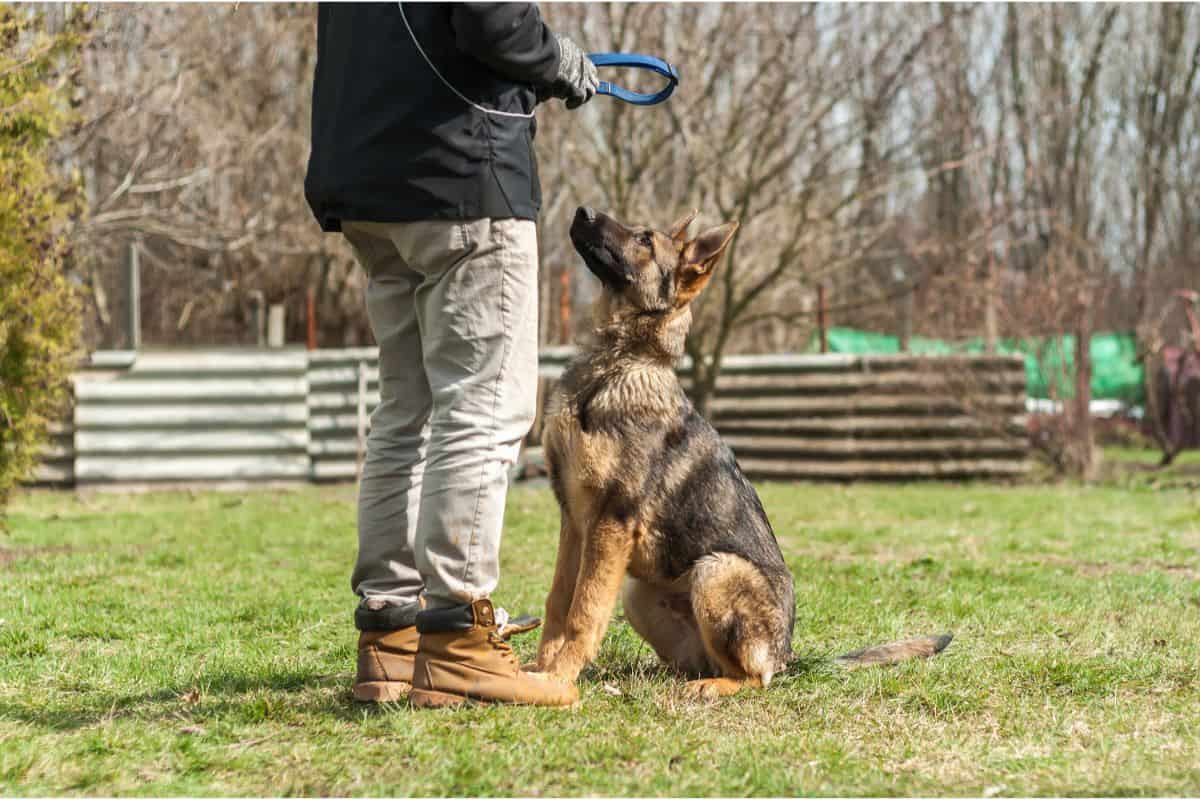Is It Worth Getting A Purebred German Shepherd Puppy?: How Much German Shepherd Puppies Cost?
The third most intelligent dog breed on the planet, German Shepherds are incredible dogs that are beloved by their owners for their loyalty, temperament, obedience, and how easy they are to train.
It’s no surprise then that German Shepherd puppies are highly sought after, and people often wonder if they can afford this wonderful dog.
Generally, a German Shepherd puppy that is purchased from a trusted breeder can cost anywhere from $1,800 to $3,000.
A few things will factor into the price of the puppy, from the age of the puppy, to the color of its coat, where you live, and how much the breeder has paid for vaccinations and health checks.
If you adopt a German Shepherd from an animal shelter it can set you back $150, but some rescue organizations can also charge up to $500 for a German Shepherd.
Sometimes you might get lucky – a friend or a family member might have a German Shepherd who has birthed a litter and is looking to find good homes for the puppies.
In this instance, a German Shepherd puppy will be a lot cheaper, and maybe even be free! But what about if you’re not so lucky to have this kind of connection?
Below, we’ll take a look at the annual cost of a German Shepherd puppy, and how much different types of German Shepherds will cost. But first, let’s take a look at the factors that make German Shepherd Puppies expensive.
What Makes A German Shepherd Puppy Expensive?
Age
This is arguably the most important factor that determines how much you’re going to pay for a German Shepherd. Basically, the younger a puppy is, the cuter it is, and that is what a lot of people are looking for when buying a puppy!
German Shepherd puppies that are 8-12 weeks old will cost more than older puppies, because this is arguably when they’re at their cutest. Everybody wants a cute puppy so the demand sends the price to skyrocket.
If the puppies are 12 weeks old or older then the price will start to drop. When buying an adult German Shepherd then the prices will be even lower.
It’s also worth noting that if you buy a senior German Shepherd then your budget will have to factor in for things like medical costs, as older dogs are more likely to have health issues.
Coloring
The coloring of a dog’s coat can affect its price. With German Shepherds in particular, white German Shepherds will be more expensive than tan or black German Shepherds. This is due to the rarer coat colorings being harder to breed.
Genetics
While purebred German Shepherds are highly sought after, puppies that are mixed breed are usually more affordable and tend to be healthier, which will save on vet costs in the long run!
Size Of The Litter
Basically, the more puppies there are in a litter, the more affordable a single puppy will be.
Where You Live
It may come as a surprise to learn, but where you live will affect the price of a German Shepherd puppy. For example, if you live in an area where the cost of living is low, or where there isn’t as much demand for German Shepherds you can pay less for puppies.
Plus, some states or cities will have more breeding regulations that can make puppies more expensive.
Health Screenings/Vaccinations
Any reputable breeder will be able to provide evidence that they’ve vaccinated their puppies, and the results of health screenings. Some breeders may even pay for and provide proof of genetic testing, which gives you an insight into health issues concerning a specific breed and even behavioral traits.
Breeders pay a pretty penny for all these screenings, vaccinations, and tests, and this will of course increase the price they’re charging for their puppies.
Types Of German Shepherd Puppies And Their Cost
In your research you may have seen that there are different types of German Shepherds out there, and Purebred German Shepherds come in many different sizes, body types, and coloration.
However, you can divide German Shepherd types into working lines and show lines, and there are five unique variations.
American/Canadian Show Line
Price: $1800 – $3000
As the name might suggest, the American/Canadian Show Line is often seen at dog shows in the US and Canada. The angulation of their back legs is distinctive, as it’s shorter than their front legs.
They also have smaller heads and slender bones. American/Canadian Show Lines can come in a few colors, but mainly they have solid bi-color variations, such as black with a tan saddle.
This type of German Shepherd was initially bred for their looks. Compared to other German Shepherds they don’t have as much energy when compared to working lines. Still, they are playful and obedient and make brilliant pets.
West German Show Line
Price range: $5,000 – $8,000
The West German Show Line is solely bred according to the German Shepherd Breed Standard. What this means is there are specific minimum measurements for their elbows and hips, and what you get is a dog that has a beautiful and uniform appearance.
West German Show Lines have a super strong and pronounced build with a black and tan saddle.
They make excellent guard dogs, and require plenty of exercise and regular training. West German Show Lines are incredibly sociable and make a great family pet.
West German Working Line
Price range: $1,800 – $3,000
The West German Working Line is mainly bred to be working dogs, and you’ll often find these dogs in military or law enforcement settings. They are bred to endure tough situations.
You often see this type of German Shepherd in movies, and they are also close relatives to the original breed of German Shepherd developed by Max von Stephanitz.
West German Working Lines have a good temperament, and are excellent working dogs as well as amazing family pets.
DDR/East German Working Line
Price range: $2,500 – $3,000
DDR/East German Working Line dogs were bred after World War II, and following the war were strictly maintained by the East German government. These dogs are so strictly bred to prevent the gene pool from becoming diluted.
DDR/East German Working Line dogs cannot have any history of health conditions such as hip dysplasia if you want to breed them. They have an incredibly distinct look, with large bones, a lard head, and a glossy dark coat.
These dogs can also withstand adverse weather conditions for an extended period of time, thanks to initially being bred as guard dogs between the border of East Germany and West Germany.
Czech Working Line
Price range: $2,500 – $3,000
The Czech Working Line is essentially an evolution of the DDR/East German Shepherd. They have even stricter breeding standards if you can believe it, and the Czech Working Line is the most intense breed of German Shepherd around.
Czech Working Lines were not bred for their appearance. Rather, they are totally obedient and loyal dogs with a great temperament. They also may be the best guard dogs ever!
What Else Can Affect The Price Of A German Shepherd Puppy?
If your puppy has hunting champions in its lineage then it is likely they will have the same qualities as their relatives and this will drive up the price when compared to puppies whose parents are not champions.
The most costly German Shepherd adult dogs you can buy are breeding dogs, K9s, or those who have won dog shows.
The Annual Cost Of Owning A German Shepherd
We all know that choosing your puppy is just the beginning of the journey of dog ownership! There is also the cost of looking after your puppy as they grow into a healthy, happy dog.
How much it will cost to look after your German Shepherd will depend on the individual dog, and their age, size, and health. How much it will cost to look after a German Shepherd will depend on where you live, as well the equipment and supplies you buy.
But below we’ll take a look at some general figures so you can see on average how much it will cost to care for a German Shepherd.
The Cost Of Looking After A 1-Year-Old German Shepherd
- Food: $300 – $500
- Medical care (laboratory tests and general care): $100 – $200
- Vaccinations/immunizations: $100 – $200
- Neutering/spaying: $100 – $300
- Parasite control and treatment: $100 – $150
- Miscellaneous expenses, such as a collar, grooming supplies, training, leash, bowls, and toys: $500 – $1,000
So all in all, the cost of looking after a German Shepherd puppy in the first year will be $1,100 – $2,350.
As your German Shepherd puppy grows, the annual costs could increase to:
- Food: $500 – $1,000
- Medical care: $100 – $200
- Vaccinations/immunizations: $100 – $200
- Parasite control and treatment: $100 – $150
- Miscellaneous costs: $500 – $1,000
This brings the total yearly cost to $1,300 to $2,550. It’s important to keep in mind these figures are just estimates and don’t take into account costs that are related to unexpected injuries, illness, boarding, travel, and activities like competing in dog shows.
Also, as dogs get older they will need more health care than younger adults or puppies.
If your German Shepherd reaches the age of about 12, you could easily be paying on average $15,400 to $30,400 or more.
What Is A Reasonable Price To Pay For A German Shepherd Puppy?
When trusted breeders are trying to decide how much they’re going to sell their German Shepherd puppies for, they need to take into account the cost of things like breeding, raising, feeding and caring for the puppies and also their mother.
$1,200 to $2,000 is considered a reasonable price to pay for a purebred German Shepherd puppy. Again, this will all depend on the size of the litter and where you live.
Understanding the cost that goes into caring for purebred German Shepherd puppies can help us understand why breeders charge the prices they do.
- AKC registration (Basic Individual Dog Registration): $30
- Vaccinations: $100 – $500
- Microchipping: $50
- Deworming: $25
- Check-ups at the vet: $125
- Genetic health testing: $250 – $750
Therefore, the least you can expect to pay for a puppy is $580.
Parental Costs (For The Mom)
- Stud services: $500 – $1000
- C-sections and other complications during birth: $2,000 – $7,000
- Cost of dog food, supplements, and vitamins: $100 – $200
- Check-ups at the vet: $125
- Veterinary check-ups: $125
The lowest possible cost of maternity care for an uncomplicated birth is $725.
So when we take into consideration how much a breeder has to pay at the very least for caring for the puppies and their mother.
If you are looking to adopt a puppy, however, stay away from a budget pet store or people claiming to sell cheap puppies online. They should be avoided because these puppies are often bred in extremely poor, inadequate conditions and are more likely to have health problems.
These puppies are usually bred in puppy mills, or at the very least are bred by backyard breeders or breeders with little experience. These breeders are usually more concerned with making a profit than they are with making sure their puppies are healthy.
If you buy a puppy for cheap, you may be saving money in the short term, but those vet bills are going to mount up.

Male vs Female: What German Shepherd Puppy Should I Get?
If you’re undecided between getting a male German Shepherd or a female, your experience with handling dogs is something to consider.
If you have never owned a German Shepherd before or if you’re getting a family dog, then it’s better to opt for a female. However, if you want a guard dog to protect your home, or a working dog then we would recommend a male German Shepherd.
No matter their sex, German Shepherds are obedient, intelligent, and full of energy. But there are a couple of differences between male and female to consider.
Namely, male German Shepherds tend to be larger, which is why they’re terrific guard dogs. They tend to be more aggressive, and have a dominant temperament.
They can be territorial, and very possessive of you as their owner, as they want to protect you from harm. They also tend to have a favorite member of the family so to speak.
They will normally gravitate towards the person who is feeding them, training them, and spending the most time with them.
On the other hand, female German Shepherds are a lot smaller than males, and they also mature quicker. This means that female German Shepherds are simpler to train and handle.
Female German Shepherds are not as territorial as males, and do not tend to favor certain members of the family. This is why they’re an amazing family pet and usually get on well with children.
Things To Consider Before Getting A German Shepherd
Depending on their diet, how you care for them, and even their sex, German Shepherds can live for up to 10 or 12 years, and so before you get a German Shepherd think about how much time you have to dedicate to looking after your canine companion.
For example, can you walk your German Shepherd for an hour every day, do you have the time to groom them every day, and perhaps most importantly, do you have the time and patience to train them.
It is crucial that you take the time to train, socialize, walk and groom your German Shepherd properly. If you don’t have the time and commitment to these things, then you might be better suited to another breed of dog.
German Shepherds were initially bred as work dogs to make humans’ lives easier. Therefore, attachment to their owners is ingrained in their DNA, more so than most dogs.
Caring for a dog is often compared to caring for a child that never grows up, and this is particularly true with German Shepherds who are committed to their owners. Unlike children who grow up to be independent adults, who learn to talk and act for themselves, dogs do not have that luxury.
German Shepherds do not stay puppies for long, and grow into large dogs that weigh over 100 lbs, but that doesn’t mean they’ll become more dependent.
No matter how well you train a German Shepherd they will still have moments of separation anxiety when you’re not around, which can lead to them chewing at your furniture and damaging it.
Let’s take a look at some further considerations you need to make before adopting a German Shepherd, and what factors are conducive to being an excellent German Shepherd owner.
Active Lifestyle
As German Shepherds were bred to be working dogs they require plenty of exercises that get their hearts racing, but also their minds working. They don’t just need long walks, but they also need to play fun games like tug of war or fetch to keep their brains stimulated.
According to the American Kennel Club, adult German Shepherds should be exercising for two hours every day, so if you have an active lifestyle it’s great to incorporate your German Shepherd into it.
If you’re into walking, running, hiking or biking then take your German Shepherd with you! They make a great exercise buddy.
But if you’re not a very active person but do want to get more into exercise to improve your health, your German Shepherd and their exercise needs can be a great motivator.
German Shepherds are incredibly smart dogs, and they can easily get bored with some activities. Therefore, it’s good to regularly introduce them to new games and introduce them to new environments.
Living Conditions
German Shepherds are incredibly loyal and will never leave your side, so it’s important that your living conditions can accommodate you, your family, and your German Shepherd.
It’s important to keep in mind that German Shepherds are large dogs. An adult male German Shepherd can weigh around 100 lbs, so they will need plenty of space.
Before you adopt a German Shepherd, it’s important to talk to your partner, children, and anybody else you live with about bringing a dog into your home and if they would be happy to share the caring responsibilities for it.
If you have children, you have to be willing to include them in dog training so they can feel comfortable around your German Shepherd and your dog can feel comfortable around them.
If you live in an apartment, consider if it is big enough to accommodate a German Shepherd and does your building have any restrictions on owning pets.
You also need to consider the potential noise your German Shepherd will make such as barking, pacing or howling when you’re not there, and how this will affect your neighbors. Will they be tolerant, or will they be unhappy with this noise?
It’s also important to consider if you have enough backyard space for your German Shepherd to exercise, and enough space in your neighborhood to take your dog for a walk.
Other Pets
Another important aspect to consider is whether you have other pets (such as other dogs or cats) that your German Shepherd will have to become socialized to.
German Shepherds were originally bred as herding dogs, and so have a powerful protective streak to guard their owners. This is an admirable trait, but can become an issue when it turns into unchecked aggression.
If a German Shepherd is not socialized from an early age they can become too protective and defensive and act aggressively towards other people outside the family home, and pets.
The last thing you want is a dog that barks or lunges at everybody while taking them for a walk, or if you’re having people over to your house.
It’s important to socialize dogs as puppies, particularly with children. It’s important to teach your German Shepherd to feel safe and relaxed around other people and pets.
The reason why there are so many young dogs in animal shelters is because they were not trained or socialized properly as puppies. German Shepherds will be nearly fully grown at 8-10 months, and at 100 lbs it’s hard for an adult to control them when they’re acting out.
Even if your German Shepherd has been properly socialized, some end up in animal rescues because owners are not prepared to meet their physical needs in terms of exercise.
If German Shepherds do not receive proper training and socializing – or if it’s left too late – it will take longer to encourage and instill positive behaviors and curb concerning ones such as barking, jumping, and biting.
German Shepherds who don’t get enough exercise or are bored due to lack of attention are also more likely to act out and damage your furniture.
So once again, it’s so important that you have the time and dedication to properly train your German Shepherd.
Health Issues
German Shepherds are likely to develop common health issues, due to their breeding history and also their large size. The most common ailments to effect German Shepherds are:
- Ear infections
- Sensitive stomach that leads to vomiting and diarrhea
- Skin allergies
The older your German Shepherd gets the more likely they are to develop serious health issues like:
- Progressive Retinal Atrophy (this leads to night blindness)
- Elbow dysplasia
- Bloating (i.e. twisted stomach that can cause instant death)
- Pancreatitis
- Hip Dysplasia (this is extremely common)
- Urinary Tract Infections (this can lead to kidney stones)
- Arthritis
- Cancer
Like with any pet, you need to be financially and emotionally prepared for the likelihood that your German Shepherd’s health will decline and need more care in their later life.
Heavy Shedding
With their double coat of medium length hair, German Shepherds constantly shed and lose their undercoat in spring and fall. Expect to find fur balls all over your house, on your clothes, your floor, your couch, your table, everywhere!
Many German Shepherd owners admit that they can no longer wear dark colors at home and have their Roomba cleaning up after their German Shepherd’s fur constantly.
Separation Anxiety
We already mentioned this briefly, but we can’t underestimate how much German Shepherds feel separation anxiety.
German Shepherds are bred to be working dogs, and they always want to be active. If you’re out of the house for work and you have to leave your German Shepherd behind, their boredom at being alone can easily transform into separation anxiety.
Separation anxiety can manifest as barking and howling throughout the day, chewing on furniture, or marking.
Adult German Shepherds start to feel separation anxiety when they’re left on their own for more than 3-4 hours. This is why it’s so important to keep them active, both physically and mentally.
Many German Shepherd owners will ask their friends, family or neighbors to help take care of their German Shepherds when they’re not around.
If that’s not possible, many owners will hire dog sitters or dog walkers to keep their German Shepherd company and make sure it’s getting the exercise they need when they’re not there.
Frequently Asked Questions
Is It Possible To Adopt A German Shepherd For Free?
It is, but you have to be very lucky. For example, you might know somebody who has a German Shepherd and is no longer able to take care of it, or you may know somebody whose German Shepherd has recently given birth to a litter of puppies.
Is A German Shepherd A Good First Dog To Adopt?
If you are able to dedicate the time to training and socializing your German Shepherd, to grooming and taking them on walks, and if you’re able to afford their vet care then there is no reason that a first-time owner can’t adopt a German Shepherd.
Final Thoughts
Adopting a German Shepherd – or any dog for that matter – is not a decision to be taken lightly.
It’s crucial to do as much research as possible before adopting a German Shepherd, not just the financial costs but the demands it places on your time and the sacrifices you have to make to properly care for this wonderful breed.
We hope this article has given you all the information you need to make an informed decision, and so you can make sure you have the budget and resources you need for adopting a German Shepherd.






